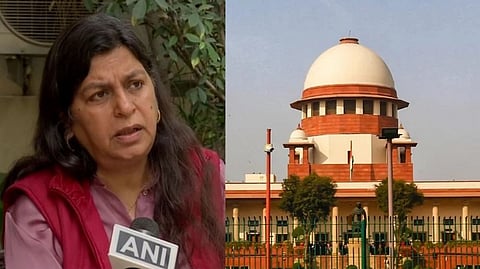

NEW DELHI: Following the Supreme Court order that it can dissolve a marriage on the ground of irretrievable breakdown and waive of 6-18 months waiting period for divorce, Advocate Geeta Luthra said that cases of matrimony must be decided much earlier because each day in a person's life is valuable.
On Monday, a five-judge Constitution bench of the Supreme Court held that by invoking special power granted to it under Article 142 of the Constitution, it can dissolve a marriage on the ground of irretrievable breakdown and waive of 6-18 months waiting period for divorce.
"Supreme Court's being ambivalent on this issue. There have been voices of the SC saying that 142 can't come where there is substantive justice to be done. According to me, cases of matrimony must be decided much earlier because each day in a person's life is valuable," said Geeta Luthra.
Advocate Ashwini Upadhyay said that the SC's order on divorce will not benefit the common man.
"Supreme Court said it can invoke special power granted to it under Article 142 of the Constitution and that a mandatory waiting period of 6 months for divorce through mutual consent can be dispensed with subject to conditions. This will not benefit the common man. It would have been better if SC could have made guidelines to fast-track hearing on matters of divorce," he said.
A Constitution Bench of Justices Sanjay Kishan Kaul, Sanjiv Khanna, Abhay S Oka, Vikram Nath and JK Maheshwari held that it could waive the waiting period of 6 to 18 months prescribed for seeking divorce through mutual consent as per Section 13-B of the Hindu Marriage Act 1955, subject to conditions.
Article 142 empowers the Supreme Court to pass decrees and orders which are necessary for "doing complete justice" in any cause or matter pending before it.
"This Court, in the exercise of power under Article 142(1) of the Constitution of India, has the discretion to dissolve the marriage on the ground of its irretrievable breakdown. This discretionary power is to be exercised to do 'complete justice' to the parties, wherein this Court is satisfied that the facts established show that the marriage has completely failed and there is no possibility that the parties will cohabit together, and continuation of the formal legal relationship is unjustified. The Court, as a court of equity, is required to also balance the circumstances and the background in which the party opposing the dissolution is placed," the bench said in its verdict.
It also said that contesting parties cannot directly approach the top court or High Courts and seek dissolution of marriage on the ground of irretrievable breakdown.
"The reason is that the remedy of a person aggrieved by the decision of the competent judicial forum is to approach the superior tribunal/forum for redress of his/her grievance. The parties should not be permitted to circumvent the procedure by resorting to the writ jurisdiction under Article 32 or 226 of the Constitution of India, as the case may be," it said.
"The legislature and the courts treat matrimonial litigations as a special if not a unique, category. The public policy underlying the legislations dealing with family and matrimonial matters is to encourage mutual settlement...," it said while saying the parties can't move the higher courts directly for dissolution of the marriage.
The order of the apex court came on an issue of whether divorce can be granted on the ground of irretrievable breakdown of the marriage by invoking special powers under Article 142 of the Constitution.
A batch of petitions was filed in the apex court relating the use of the apex court's plenary powers to dissolve a marriage between consenting parties without referral to family courts to wait for the mandatory period prescribed under Section 13-B of the Hindu Marriage Act.
The case was referred to a five-judge Bench on June 29, 2016, by a division bench.
Visit news.dtnext.in to explore our interactive epaper!
Download the DT Next app for more exciting features!
Click here for iOS
Click here for Android